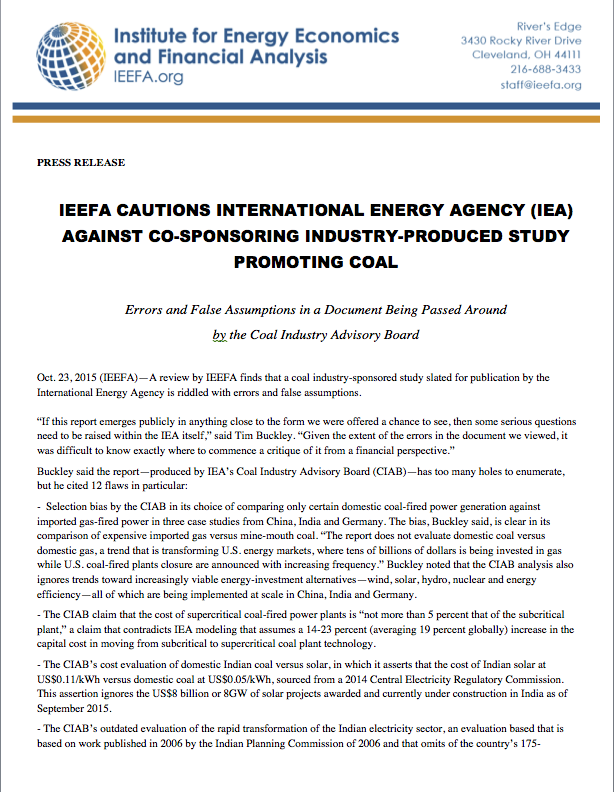IEEFA Cautions International Energy Agency (IEA) Against Co-Sponsoring Industry-Produced Study Promoting Coal

Oct. 23, 2015 (IEEFA)—A review by IEEFA finds that a coal industry-sponsored study slated for publication by the International Energy Agency is riddled with errors and false assumptions.
“If this report emerges publicly in anything close to the form we were offered a chance to see, then some serious questions need to be raised within the IEA itself,” said Tim Buckley, IEEFA’s director of energy finance Studies, Australasia. “Given the extent of the errors in the document we viewed, it was difficult to know exactly where to commence a critique of it.”
Buckley said the report—produced by IEA’s Coal Industry Advisory Board (CIAB)—has too many holes to enumerate, but he cited 12 flaws in particular:
- Selection bias by the CIAB in its choice of comparing only certain domestic coal-fired power generation against imported gas-fired power in three case studies, from China, India and Germany. The bias, Buckley said, is clear in the study’s comparison of expensive imported gas versus mine-mouth coal. “The report does not evaluate domestic coal versus domestic gas, a trend that is transforming U.S. energy markets, where tens of billions of dollars is being invested in gas while U.S. coal-fired plant closures are announced with increasing frequency.” Buckley noted that the CIAB analysis also ignores trends toward increasingly viable energy-investment alternatives—wind, solar, hydro, nuclear and energy efficiency—all of which are being implemented at scale in China, India and Germany.
- The CIAB claim that the cost of supercritical coal-fired power plants is “not more than 5 percent that of the subcritical plant,” a claim that contradicts IEA modeling that assumes a 14-23 percent (averaging 19 percent globally) increase in the capital cost in moving from subcritical to supercritical coal plant technology.
- The CIAB’s cost evaluation of domestic Indian coal versus solar, in which it asserts that the cost of Indian solar at US$0.11/kWh versus domestic coal at US$0.05/kWh (based from a 2014 India Central Electricity Regulatory Commission report). The evaluation ignores the US$8 billion or 8GW of solar projects awarded and currently under construction in India as of September 2015.
- The CIAB’s outdated evaluation of the rapid transformation of the Indian electricity sector, an evaluation based on work published in 2006 by the Indian Planning Commission of 2006 and that omits the country’s 175-gigawatt renewable-energy agenda announced this year.
- The CIAB’s assertion that the net present value (NPV) of Reliance Power’s US$4bn Sasan Power project in India is US$55 billion, a claim that relies on a job-creation multiplier of 31.5 times—for each of the 639 direct jobs involved in operating the Sasan plant, the CIAB asserts that 20,141 additional jobs will somehow be created.
- The CIAB’s claims around the “substantial socioeconomic benefits” of coal from the “particularly long supply chain” the industry uses in freighting coal long distances.
- The CIAB’s failure to mention the documented health hazards for coal miners, including the long history of black lung litigation in mining communities across the U.S., while critiquing the health hazards of the nuclear power industry by noting that “the risk of cancer is higher among uranium miners.”
- The CIAB’s unsupported notional assertion that “societal benefits of advanced coal generation … are of infinite importance.”
- The CIAB’s omission of mention—specifically in its evaluation of the commercial viability of Germany’s reliance on domestic coal for power generation—that German taxpayers keep the industry afloat.
“IEEFA would express grave concerns if the document we’ve seen bears any resemblance to the final approved public document,” Buckley said. “Any financial analyst or journalist that utilized such a document without understanding the full extent of the flaws it is based on, exactly who wrote it, and for what purpose, would be doing their readers a disservice.”
“We also strongly believe that the IEA should examine the misuse of its brand and how such misuse undermines its legitimacy,” Buckley said.
Media contact: Karl Cates, [email protected], 917.439.8225
About IEEFA
The Institute for Energy Economics and Financial Analysis (IEEFA) conducts research and analyses on financial and economic issues related to energy and the environment. The Institute’s mission is to accelerate the transition to a diverse, sustainable and profitable energy economy and to reduce.












